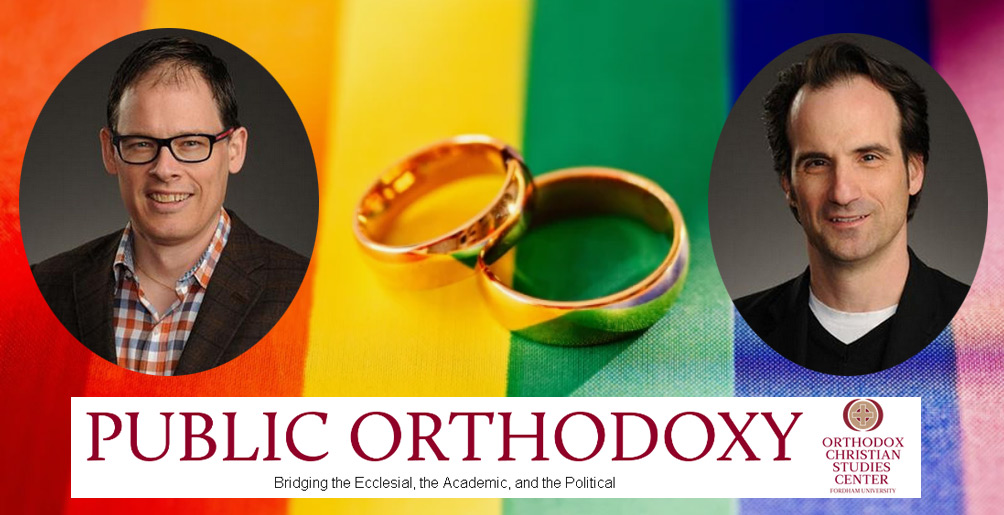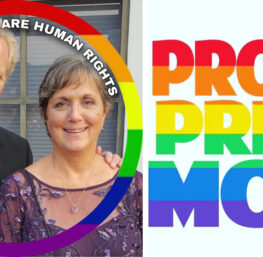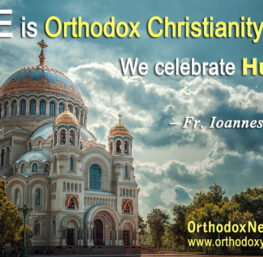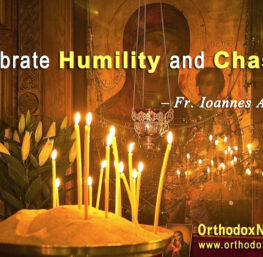 by Fr. Ioannes Apiarius –
by Fr. Ioannes Apiarius –
George Demacopoulos and Aristotle Papanikolaou are getting paid to pressure the Orthodox Church to accept LGBTQ+ ideas.
![]()
The progressive academics who run “Public Orthodoxy” website, supported by the Orthodox Christian Studies Center at Fordham University, frequently distort and challenge the true Orthodox Church teaching, theology, and practices. They also now promote the LGBTQ+ agenda and defend the legalization of same-sex “marriage.”
These academics are actively working to pressure the Orthodox Church to accept LGBTQ+ principles. They want to change the Orthodox teaching to accommodate LGBTQ+ self-identity and embrace LGBTQ+ individuals and couples; without any change in their homosexual, bisexual, transgender, and queer identities, lifestyles, and beliefs.
Founded and managed by George Demacopoulos and Aristotle Papanikolaou, this organization has often promoted progressive ideas that are alien to the genuine theology of the Orthodox Christian faith. With their embrace of LGBTQ+ ideas and defense of same-sex unions, it’s evident that these academics have become more brazen in their attempts to undermine the Orthodox Church right teaching. (Demacopoulos and Papanikolaou also get paid to promote the LGBTQ agenda.)
Here’s a sample of the things Public Orthodoxy and the Orthodox Christian Studies Center have done to promote and advance the LGBTQ+ agenda and pressure the Orthodox Church to accept homosexuality, transgenderism, and other sexual deviances as “normative.”
![]()
LGBTQ+ and Orthodox Tradition: What Does It Actually Say?
https://publicorthodoxy.org/video/lgbtq-and-orthodox-tradition/
First panel session from the event “Seeking Harmony and Compassion: Pastoral Care and LGBTQ+ Orthodox Faithful,” held at Fordham University’s Lincoln Center Campus October 13, 2023.
As Orthodox Christians, we are called, first and foremost, to love all—for “God is love.” But the reality for many lesbian, gay, bisexual, transgender, and queer Orthodox Christians today is that their relationship to the Church is defined not by love, but by apathy, exclusion, and condemnation. We must, as a faith, choose love and compassion—to “love thy neighbor”— instead. This requires no change of faith, but a fuller, more compassionate understanding of what our faith in loving God truly requires of us.
Ministry among LGBTQ+ Orthodox Faithful – Opportunities, Challenges, and Resources
https://publicorthodoxy.org/video/ministry-lgbtq-orthodox-faithful/
Second panel session from the event “Seeking Harmony and Compassion: Pastoral Care and LGBTQ+ Orthodox Faithful,” held at Fordham University’s Lincoln Center campus on October 13, 2023.
As Orthodox Christians, we are called, first and foremost, to love all—for “God is love.” But the reality for many lesbian, gay, bisexual, transgender, and queer Orthodox Christians today is that their relationship to the Church is defined not by love, but by apathy, exclusion, and condemnation. We must, as a faith, choose love and compassion—to “love thy neighbor”— instead. This requires no change of faith, but a fuller, more compassionate understanding of what our faith in loving God truly requires of us.
Listening to LGBT+ Christians
https://publicorthodoxy.org/2019/06/25/listening-to-lgbt-christians-a-review-of-the-revoice-conference/
…
The modern language of LGBTQ+ identity, while often unhelpfully obfuscating the boundaries between ontology, phenomenology, and epistemology, has been tremendously helpful in uniting and giving voice to people whose experience of sexual attraction and gender is at odds with what the majority of society (often uncritically) prescribes as normative.
…
Orthodox Christians who find themselves skeptical of LGBTQ+ language and hesitant to engage our communities would benefit from witnessing the consequences that enforced scrupulosity has had on LGBTQ+ people in the Church, and the joy with which we nevertheless worship the Christ who loves us.
…
Until then, Revoice has proven to be a valuable space for LGBTQ+ Christians to find healing, solidarity, joy, and hope as we seek to follow Christ more truly, and freely, without fear of antagonism or misunderstanding from churches that have historically been prone to treat us with both.
Seeking Harmony and Compassion – Helping Parishes with LGBTQ+ Ministry
https://publicorthodoxy.org/video/lgbtq-parish-ministry/
Orthodox Christians are called, first and foremost, to love all—for “God is love.” But the reality for many lesbian, gay, bisexual, transgender, and queer Orthodox Christians today is that their relationship to the Church is defined not by love but by apathy, exclusion, and condemnation. As a faith, we must choose love and compassion—to “love thy neighbor”— instead. This requires no change of faith, but a fuller, more compassionate understanding of what our faith in loving God truly requires of us.
We are pleased to present this conversation about ministering to LGBTQ+ Christians. Drs. Christina Traina of Fordham University and Ashely Purpura of Purdue University discuss the opportunities, challenges, and resources for ministry among LGBTQ+ faithful.
The Things That Are God’s and the Things That Are Caesar’s
On the Legalization of Same-Sex Marriage in Greece
https://publicorthodoxy.org/2024/02/22/what-is-gods-what-is-caesars/
One of the temptations invariably plaguing priests and preachers as they proffer declarations and proclamations is the tendency to offer solutions to non-existent dilemmas, providing answers to questions nobody is asking or addressing the wrong audience. Which is why it is hardly surprising that various Orthodox hierarchs and circles feel the need to express disproportionate fervor and excessive alarm on the current debate around the same-sex marriage bill that just passed in the Greek parliament.
With the legalization of same-sex marriage, Greece becomes the first Orthodox-majority country with equality in civil marriage. In Russia, merely promoting or parading with LGBTQ is still punishable with imprisonment by the State with the endorsement, if not blessing of the Church. And in Georgia, simply praising or protesting in support of gay pride incites social animosity with the tolerance, if not formal backing of the Church.
The extreme and excessive noise of conversations and statements at this time, as well as the toxicity and hypocrisy of condemnations and anathemas, would undoubtedly find more fertile ground if addressed to parish programs and parishioners preparing for the sacraments of marriage or baptism. What is clearly missing from the otherwise pedantic clamor and superfluous commotion in Greece is a sober reflection based on the ethical prescriptions of the Gospel.
Morality is one thing (perhaps open to the moralism of the Church), but legality is another (with far less room for criticism, even by the Church). There are things that are God’s, and others that are Caesar’s (Mt. 22.21).
…
It is regrettable that the Church appears “primitive” on matters pertaining to science and law (including such issues as civil marriages and digital identities)—namely, with regard to everything that has emerged in recent decades, even centuries—yet “pioneering” in the dissemination of conspiracy theories. And although we are in the 21st century, some hierarchs still insist on identifying homosexuality with pathological symptoms that require psychotherapy or conversion!
Same-Sex Marriage in Greece: A Critical Analysis
https://publicorthodoxy.org/2024/02/14/same-sex-marriage-in-greece/
…
The Synod claims its objection to the proposed legislation is based upon scriptural, canonical, and patristic tradition. But its reading of those documents is so narrow that it undercuts the Orthodox teaching of personhood.
The Synod writes that the legislation is “in conflict with Christian anthropology” and warns that same-sex marriage disturbs proper gender roles as well as “fatherhood and motherhood.” This belief that female-male parents translates into a particular pair of personalities presumes gender essentialism. It is precisely this use of gender essentialism that is incompatible with Orthodoxy’s theology of personhood.
…
The Synod wrongly claims that the Holy Sacrament of marriage has a singular unchanging history. The Church did not even develop a sacrament of marriage until the tenth century and, even then, it did not perform marriages for the poor (the vast majority of Christians), and women were told to endure domestic violence as an act of martyrdom.
If we all constitute the Church, and if Orthodox marriage and parenthood are ultimately about learning to love as God’s love, why would we exclude people from encountering God’s love in that way?
The Synod asks, “Why is [same-sex marriage and parenthood] being promoted with such insistence?” One answer is that our faith demands it.
What I’ve Learned in Eating Disorder Recovery
https://publicorthodoxy.org/good-reads/eating-disorder-recovery/
[xii] This essay, framed by my own experience as a white cisgender straight woman, addresses only one of many perspectives of what it is like to have an eating disorder. People of all ages, races, ethnicities, gender identities, and sexual orientations have eating disorders. In addition, the institutional church’s gender essentialist teachings harm LGBTQ people, and that harm deserves to be addressed deeply beyond the narrow scope of this essay.
…
The denial that God could ever call a woman to serve in the altar as an ordained or lay member led me to believe that my female body was, in part, unhallowed and a threat to the cooperative effort, or “synergy,” between the human person and God towards salvation.[xv] The institution marks a female body as “Other” from birth to justify excluding her. At just 40 days old, boy but not girl infants may be taken into the altar by priests.
…
Patriarchy is embedded and normalized within Orthodox Sacraments and Liturgy. During weddings, women are told, incorrectly, that they were created second from man’s “rib,” and then, without nuance or context, to “be subject in everything to their husband.”[xvi] Every few weeks, we pray about St. Mary Magdalene, whose “thinking was mundane as a weak woman.”[xvii] Perhaps it is more comfortable to dismiss such traditions as harmless isolated incidents. But sexism and misogyny are collective phenomena, in which a collection of ordinary actions or inherited traditions engaged in by individuals who may not intend harm, hurt women (and men’s ideas about women) as a whole.[xviii]
Scholar Calls for Wider Acceptance of LGBTQ Community in Eastern Orthodox Church
https://now.fordham.edu/living-the-mission/scholar-calls-for-wider-acceptance-of-lgbtq-community-in-eastern-orthodox-church/
…
Especially regarding the LGBTQ community, the Orthodox Church has consistently become “hung up on the division between Orthodox and un-Orthodox, the division between holy and unholy, taboo and sacred,” said Ashley Purpura, Ph.D., GSAS ’14, associate professor at Purdue University and visiting associate professor at Harvard Divinity School. “But there is a way that love is transcending [this divide].”
She spoke at “Seeking Harmony and Compassion: Helping Parishes with LGBTQ+ Ministry,” a discussion organized by Fordham’s Orthodox Christian Studies Center at the Lincoln Center campus.




The modern Arians. I pray that these men will stop their subversion!
These two clowns (no doubt freemasons) are brazen!! I remember years ago reading an article written by one Dr. John Boojamra, a prof who taught at that time during the 80’s and 90’s at Fordham U, and was an original founder of the so-called Orthodox Peace Fellowship. I remember reading an article in the Antiochian ‘Word’ magazine he wrote in which he attempted to justify evolutionary theory on the origins of man as compatible with the Orthodox faith while he criticized Saint Basil the Great’s ‘Hexaemeron’ as some simple side opinion, not particularly relevant or of Patristic standards. The very next month in that issue of the ‘Word’ magazine, I read his obituary which claimed he died of a massive cardiac arrest. I was waiting for a retraction from the Antiochian Archdiocese regarding his pro evolution article, but that never happened. The fear of God is the beginning of wisdom. These two homo-philias are on thin ice, I’m sure!! Disgusting!!